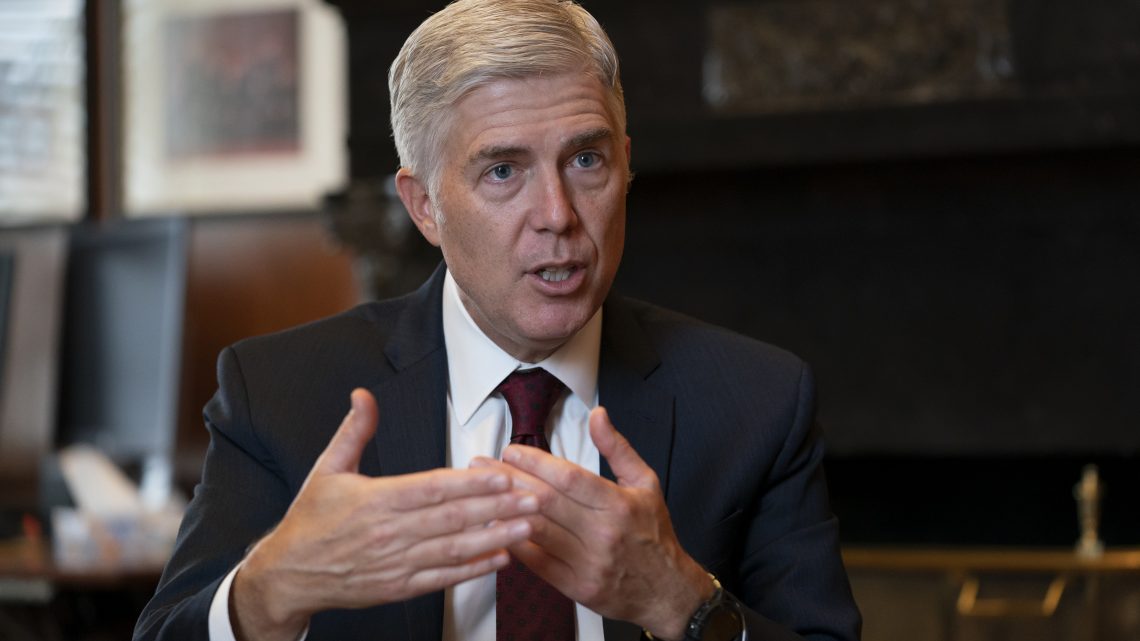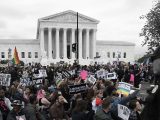
Neil Gorsuch Might Just Be the Supreme Court Justice Who Saves LGTBQ Workers’ Rights
October 8, 2019Want the best of VICE News straight to your inbox? Sign up here.
The rights of LGTBQ workers in the United States could hinge on one man: conservative Justice Neil Gorsuch, President Donald Trump’s first appointee to the Supreme Court.
The Supreme Court heard arguments Tuesday in three cases that all deal with the same question: Are LGBTQ employees protected by the Civil Rights Act of 1964, a federal law that blocks workplace discrimination “because of sex”? In his questions to lawyers, Gorsuch repeatedly suggested that his answer might be yes — and if it is, his vote to join the four liberal justices could help the employees win.
The justices first heard arguments in Bostock v. Clayton County, Georgia and Altitude Express Inc. v. Zarda, a pair of cases so similar they were bundled together. Both Daniel Zarda, a skydiving instructor who died in 2014, and Gerald Bostock, a child welfare services coordinator, sued their respective employers after they were allegedly fired for being gay.
“But isn’t sex also in play here?”
Bostock and Zarda argued that their firings violated Title VII of the Civil Rights Act of 1964, even though the law doesn’t explicitly mention sexual orientation or gender identity. Past Supreme Court cases have found that the Civil Rights Act’s ban on sex discrimination also bars employers from discrimination that’s based on gendered steretoypes — like, say, the stereotype that men are only attracted to women.
At one point during arguments Tuesday, a lawyer representing Bostock and Zarda’s employers tried to draw a line between discrimination on the basis of somebody’s sex and discrimination on the basis of their sexual orientation.
“But isn’t sex also in play here?” countered Gorsuch. When the lawyer tried to respond, Gorsuch interrupted, “And isn’t that enough?”
“In what linguistic formulation would one say that sex, biological gender, has nothing to do with what happened in this case?” the conservative justice added later in the day.
Gorsuch also signaled his agreement with the very argument the lawyers for the two gay men were trying to make. He suggested to the U.S. solicitor general that if somebody is fired over their sexual orientation, their sex is “at least one contributing cause.”
The other new conservative on the bench, Justice Brett Kavanaugh, stayed relatively quiet throughout the arguments. He once asked a question about the “literal meaning” versus “ordinary meaning” of the term “because of sex” but did not clarify what either of those phrases meant to him.
While the more-liberal justices didn’t go easy on the attorneys representing the gay men, they’ll probably rule in their favor, given that they all ruled to legalize same-sex marriage. But Anthony Kennedy was the swing justice in that 5-4 decision in 2015, and he retired in 2018. On Tuesday, Gorsuch was the only member of the court’s right wing who signaled any willingness to budge.
The second hour of arguments Tuesday moved on from Title VII’s relationship with sexual orientation and focused instead on gender identity for another case: R.G. & G.R. Harris Funeral Homes, Inc. v. EEOC. An employee at a Michigan funeral home, Aimee Stephens, sued when she was fired from her job shortly after revealing to her coworkers that she was transgender. If she had been assigned female at birth, she’s arguing, her employer would have no problem with her living as a woman.
Gorsuch, once again, showed some apparent sympathy for the LGTBQ petitioners. “I’m with you on the textual evidence. It’s close, OK?” Gorsuch, a textualist, told an attorney for Stephens. “It’s close. The judge finds it very close.”
But he also seemed concerned, like many of the justices, that a ruling for Stephens could bring sweeping changes to a nation where only about half of the states have enacted protections for LGTBQ workers. That’s a heady proposition for a man who recently remarked that the founders of the United States did not want “nine old people in Washington, sitting in robes, telling everybody else how to live.”
“At the end of the day, should he or she take into consideration the massive social upheaval that would be entailed in such a decision?” Gorsuch asked the lawyer, apparently referring to himself in the third person. The better remedy, he suggested, might be found through the legislature, not the judiciary.
“It’s a question of judicial modesty,” Gorsuch said.
Cover image: In this Sept. 4, 2019 file photo, Justice Neil Gorsuch speaks during an interview in his chambers at the Supreme Court in Washington. (AP Photo/J. Scott Applewhite, File)


